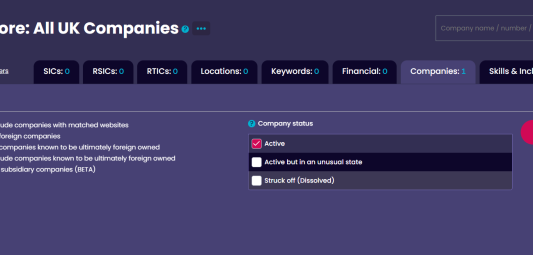At The Data City, we help organisations better understand companies and sectors using real-time data.
The ability to go beyond outdated and vague classifications like Standard Industrial Classification (SIC) codes, and see the true size, shape and growth of UK industries, has transformed how local authorities, government departments, think tanks and consultants work with data.
But one group that consistently gets huge value from our platform and tools is trade associations and industry bodies.
In this article, we’re going to look at just a few of the ways UK trade associations and industry bodies are working with The Data City to map their sectors, support evidence-led policy, and deliver more value to their members.
The role of Trade Associations
These organisations don’t just serve their members – they serve the economy.
Trade associations represent entire sectors and specialisms, often acting as the bridge between industry and government. They play a key role in delivering UK Industrial Strategy, drive investment into key technologies and regions, support workforce planning, and provide the evidence needed to influence funding and regulation.
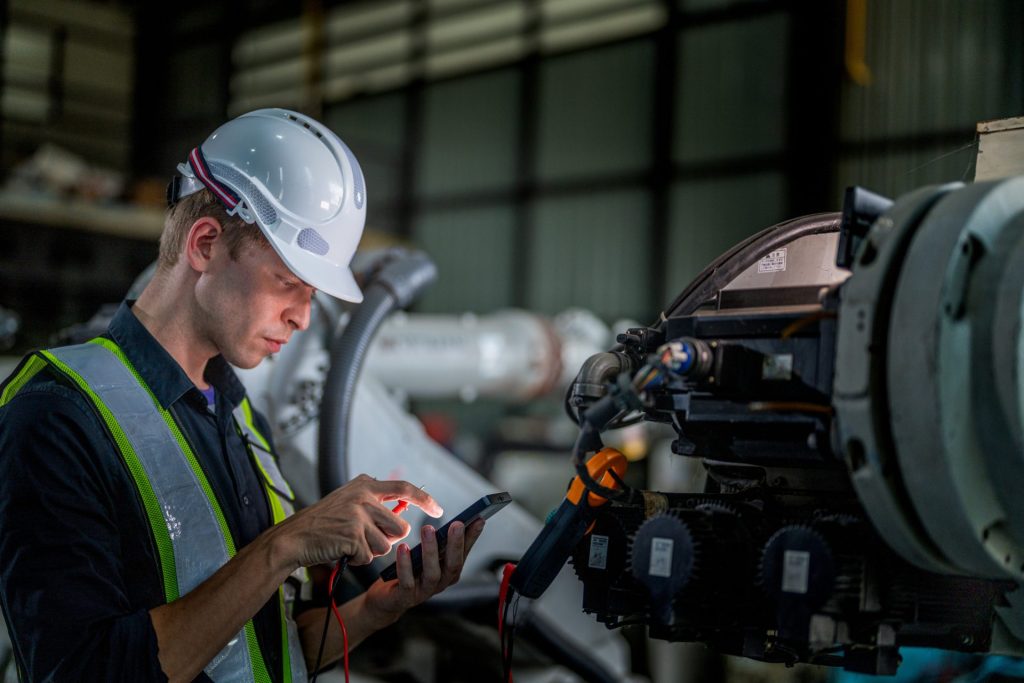
Whether it’s making the case for clean energy investment, mapping advanced manufacturing capabilities, or advocating for digital skills growth, trade associations play a vital role in the UK’s economic future.
Yet many still rely on static CRM systems to track members, outdated SIC codes to understand their sector, or disjointed datasets that make it difficult to paint a clear picture. Especially in fast-moving or emerging industries, traditional data sources fall short.
That’s where The Data City comes in.
How trade associations use The Data City
Get real-time sector insights
With our platform, Industry Engine, we house data on over 9 million UK companies and 500+ sectors, called RTICs.
Our Real-Time Industrial Classifications (RTICs) are built using a mix of explainable machine learning and input from sector experts. That means companies are classified by what they actually do, based on their website text, not what box they ticked when registering with Companies House.
These RTICs cover frontier and fast-moving sectors that SIC codes simply can’t capture – like FinTech, AI, Life Sciences, Immersive Tech and the Gaming industry. With RTICs, you get a real-world picture of how industries are evolving, not a historic snapshot of how they used to be defined.
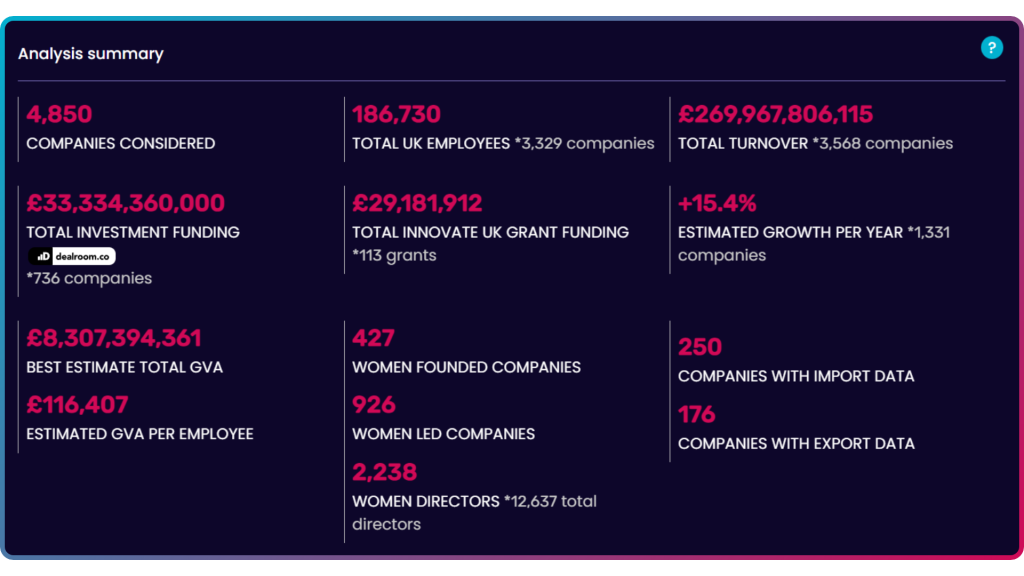
Access to the Industry Engine gives trade associations a live view of their sector. This includes:
- Number of companies
- Total employment
- Estimated growth rates
- Regional distribution
- Skills gaps
- Financial records
- Investment flows
- And much more
Whether you’re defining a new sector, writing a strategy, responding to policy or engaging with members, this clarity unlocks better decisions.
Define your industry
RTICs can be used off-the-shelf, but many of the most impactful examples are built in partnership with industry. That includes trade associations.
Our Defence sector RTIC (to be published soon) was developed in collaboration with ADS Group. The first classification of the UK Sport & Physical Activity sector was co-designed with CIMSPA. We worked with Immerse UK to map the immersive technologies landscape.
Our RTICs-as-a-Service model offers associations a way to define and sponsor their industry using trusted, real-time data.
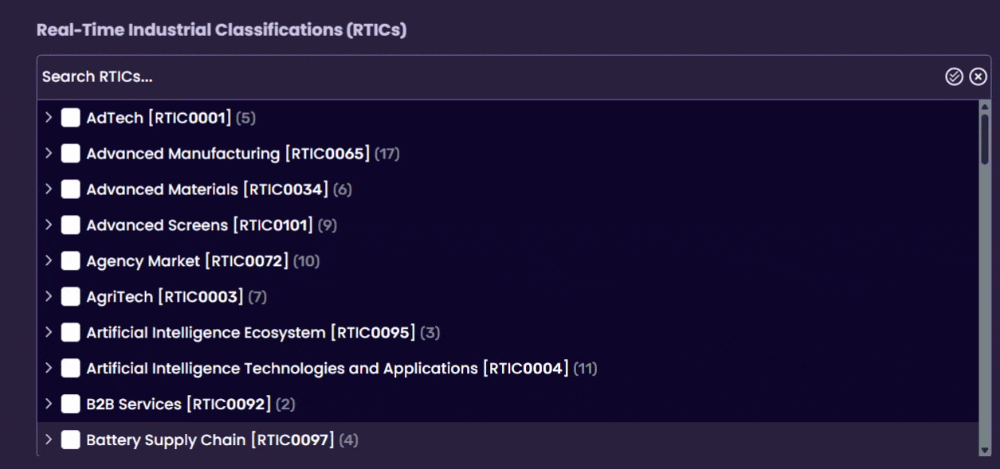
You work with our team to shape the taxonomy, define key verticals, and ensure the scope reflects how your sector really works. As a partner, you’ll get access to our data and sector experts, a full dataset, co-branded launch materials, summary reports, webinars and visibility through our platform and comms.
This process lets associations feed into how sectors are defined, giving them credibility with policymakers, funding bodies and members alike.
Understand your members
Trade associations are member-led organisations. So understanding who they are, how they operate and what support they need is vital. Especially when membership fees are a core part of your funding model.
With The Data City organisations are able to use our platform and data to enrich their understanding of member base.
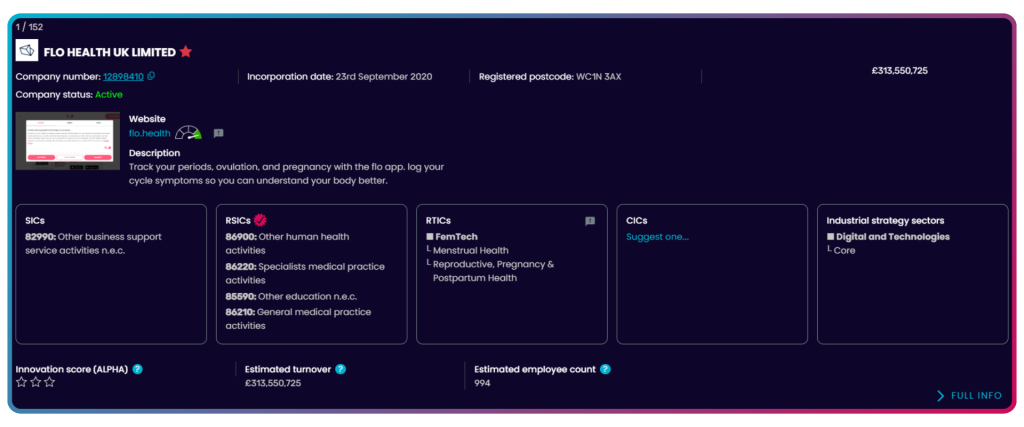
Macro insights allow you to see breakdown of company sizes (such as the amount of startups or established companies on your books), growth rates, sector and vertical splits and financial records, whilst being able to pin-point fast-growing individual companies, those getting investment and other success stories or gaps that could help you deliver value to your members.
Our API allows organisations to tap directly into our company database and look at both the make-up of entire memberships as well as individual companies.
You can also upload member lists directly into the platform, without code, and instantly generate insight, even if you don’t use our API.
Grow your membership
It’s not just about serving current members. Growth matters too. Growing the sector, growing your membership base, and growing funding opportunities all rely on knowing where to look.
The Data City Industry Engine platform is perfect for lead generation and spotting partnership opportunities. With our pre-built RTICs, with over 500+ verticals from those specialising in RegTech and Crytpo, to Life Science Research and FemTech companies, it couldn’t be easier to jump in and search companies.
From top level research, to detailed lead generation, our Explore filters allow you to refine your search based on your requirements. You can start broad or filter down instantly.
Interested in Life Sciences spinouts in the UK for example? Within a few clicks you can find over 300 companies.
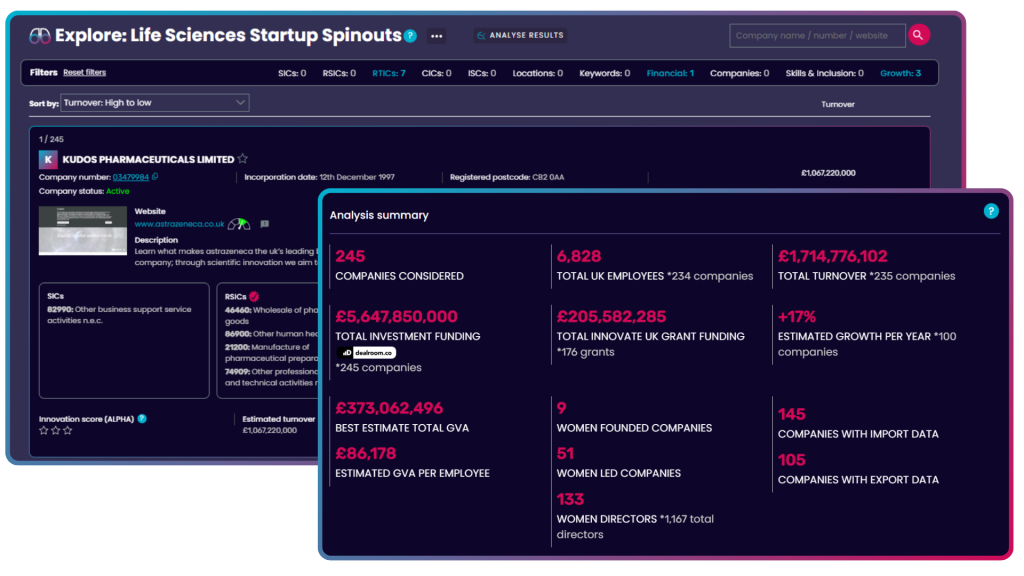
Want to go further and limit to startup spinouts with at least one round of investment, our Dealroom data allows you to do that – showing you 240~ companies.
From here you can go deeper, you could add in specific keywords, locations or cities, companies with Innovate UK funding, startups that are fast growing or other specifications to help you find new companies to work with.
You can also use our machine learning tool, the ML List Builder, to upload your existing member list and train the platform to find similar companies. Ideal for lead generation, outreach campaigns or spotting partnership opportunities.
Build bespoke tools
Sometimes you need something beyond the platform. That’s where our Data Services team comes in.
We worked with techUK, one of the UK’s largest trade associations, to help power their Local Digital Index.
It’s an interactive microsite used by regions, policymakers and investors to explore digital capability across the UK. The tool integrates our RTICs, Lightcast job market data and regional economic indicators, helping techUK shift from static PDF reports to a dynamic decision-making platform.
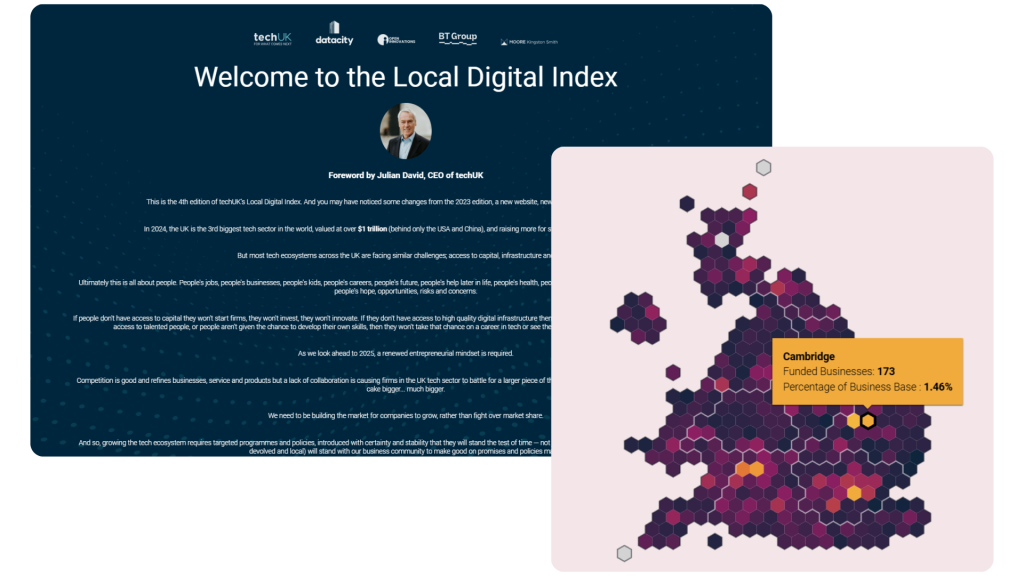
With CIMSPA, we developed the UK’s first sport and physical activity workforce directory.
In addition to launching six new RTICs, we helped them build the Data Lens – a member-facing platform to explore the data and generate insight. It makes complex data accessible and actionable, turning CIMSPA’s sector knowledge into a product that drives member value.
These bespoke tools are built on the same foundations: real-time data, clean taxonomies and intuitive interfaces that provide value to members, staff and stakeholders.
Why it matters
Trade associations and industry bodies play a vital role in the UK economy. They support business, shape policy and give industries a voice. But to lead effectively, they need clarity.
That’s why organisations like techUK, CIMSPA, Innovate Finance, HVMC and ADS Group are using The Data City to define, understand and grow the sectors they represent.
Whether you want to better understand your members, find new ones, shape policy with evidence or showcase your sector in a new way, our platform, data and services are built for you.
Work with us
If you represent a sector, community or industry group and want to lead with insight, not assumptions, we’d love to talk.
You can contact us to explore RTICs-as-a-Service or sign up for a free 7-day trial to try the Industry Engine for yourself.

